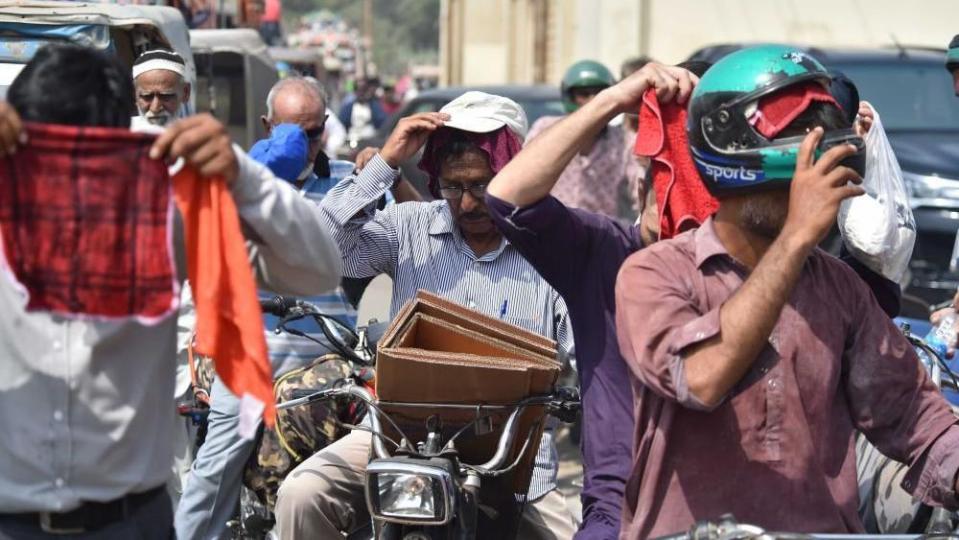As temperatures rose in southern Pakistan, so did the number of deaths.
Edhi Ambulance Service says that around 30 to 40 people travel to the Karachi city morgue every day.
But some 568 bodies have been collected in the past six days, including 141 on Tuesday alone.
It is still too early to say exactly what the cause of death was in all cases.
However, the rising number of deaths came as temperatures in Karachi rose above 40 degrees Celsius, while high humidity made it feel as high as 49 degrees Celsius, reports said.
People have gone to hospitals to seek help.
Civil Hospital Karachi admitted 267 people with heat stroke between Sunday and Wednesday, said Dr Imran Sarwar Sheikh, head of the emergency department. Twelve of them died.
“Most of the people we saw entering the hospital were in their 60s or 70s, although there were some around 45 and even a few in their 20s,” Dr Sheikh told the BBC.
Symptoms include vomiting, diarrhea and high fever.
“Many of those we saw were working outside. We told them to drink enough water and wear light clothing in these high temperatures.”
The high temperatures – described by one meteorologist as a ‘partial heatwave’ – started this weekend.
Heat wave centers and camps were set up to provide relief to the public.
Photos show children playing in fountains as they try to cool off.
“Look at me! My clothes are completely soaked with sweat,” Mohammad Imran told Reuters news agency on Monday as he struggled to keep cool.
Not everyone who needed help reached the hospital.
Wasim Ahmed knew he wasn’t feeling well when he got home.
The 56-year-old security guard had just finished a 12-hour night shift outside. Even then he thought the temperatures were too high.
“He came through the door and said I can’t stand this hot weather,” Adnan Zafar, Wasim’s cousin, told the BBC. “He asked for a glass of water. Shortly after he finished it, he collapsed.”
By the time Wasim’s family took him to the hospital, doctors said he had already died of a suspected heart attack.
He already had a heart condition, Adnan says, but he had never been bothered by the heat before.
Karachi’s struggle to cope with high temperatures is being exacerbated, some fear, by frequent power outages, which knock out the fans and air conditioning that many rely on to stay cool.
Muhammad Amin was one of the people who experienced load shedding, where the power supply was cut off. This is a common practice across Pakistan by the electricity company to maintain power supply.
His relative says their apartment experienced consistent, constant power outages.
According to his family, Mohammed, who was in his 40s, suddenly fell ill and subsequently died.
The cause of death has not yet been determined, but his family suspects it was heat-related.
Nearly thirty people were found dead on the city streets by emergency services, according to Dawn newspaper.
Many are suspected of being drug addicts, police surgeon Summaiya Syed told the newspaper. However, they showed no signs of injury.

Karachi is not the only part of Pakistan struggling to cope with the crisis.
Last month, the province of Sindh – of which Karachi is the capital – recorded a near-record-breaking temperature of 52.2 degrees Celsius, according to Reuters.
Pakistan’s neighboring countries have also experienced extreme, deadly temperatures in recent weeks.
Across the border in India, the capital Delhi is experiencing an ‘unprecedented’ heatwave, with daily temperatures exceeding 40 degrees Celsius since May, peaking at almost 50 degrees Celsius.
Doctors in the city say they have never seen anything like it.
For Karachi resident Mohammad Zeshan, it is clear what the problem is.
“This is because of climate change,” he told Reuters. “This is happening all over the world. This is happening in Europe. They have faced intense heat, but have taken steps against it.
“But here it is sad that the government has not taken effective measures.”
Experts agree that these types of extreme weather events are becoming more common and severe due to climate change.
The heat wave in Karachi is expected to continue until next week, although slightly lower temperatures are forecast.
Weather experts are now turning their attention to the monsoon season, which is expected to arrive early and bring as much as 60% more rain, according to experts who spoke to Dawn.






